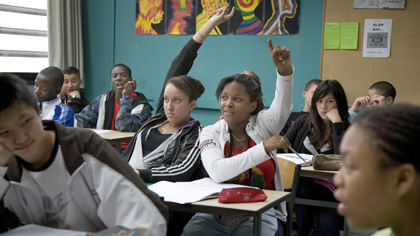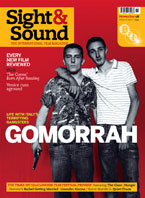The London Film Festival: The Class - Interview

The Class is loosely based on a chronicle of life in a tough multicultural school in inner-city Paris written by teacher François Bégaudeau who plays himself in the film. Working with a class of 14-year-old pupils and teachers from a similar school, Cantet has fashioned an extraordinarily vivid tale of what goes on 'between the walls' (the French title) of an average classroom in the course of a year. Ranging between comedy, violent clashes and passionate debate, the film pinpoints conflicts between teacher and pupils, and also among teachers and pupils themselves. Facing the charismatic François, some remarkable figures emerge: sassy Esmeralda and Khoumba, scholarly Wei, and troubled Souleymane who is eventually excluded from the school.
Ginette Vincendeau: How did the project come about?
Laurent Cantet: I wrote an earlier script, the story of Souleymane. Then I read François' book, which crucially gave me an insider's approach. His book is more documentary, a chronicle, while Souleymane's story provides the narrative backbone for the fictional aspects of the film.
GV: You shot the film on location, with three cameras.
LC: This gave us a lot of freedom, allowing us to improvise, to capture the energy of the pupils rather than interrupt them when we wanted a different angle. With the three cameras, one on the teacher and two on the class, we could shoot really long scenes.
GV: How did you create such a brilliant rapport with non-professional actors?
LC: We had workshops every Wednesday for three hours for more for a year. We got to know each other, tested situations and settled who would play which character. I've never had such a happy shoot. We never needed to create tension on the set in order to convey it in the film. I would give basic guidelines and then François would start the lesson. The pupils knew exactly how to react and they were free to improvise. Then we'd start again, integrating both the written lines and their earlier improvisation. For instance, during the "imperfect of the subjunctive" lesson, when Khoumba says, "it's bourgeois language", that was improvised. She'd perfectly grasped the situation and formulated what we were aiming at - class relations expressed through language.
GV: What are the reactions like so far?
LC: Some teachers claim the portrayal of the school is so bleak it's unbearable. It has been said that the film divides teachers, that it's polemical, but I think that's journalistic cliché. Some people were suspicious because they didn't like the book or felt school is never faithfully represented, but they ended up being carried away by the film, which pleases me a lot. At previews there were many adolescents who wanted to talk, which is rare in this kind of debate. I was happy when one of them said the film demystifies teachers, as this was part of the point. And the pupils in the film liked the fact that for once they were valued rather than stigmatised.
GV: Is it a utopian or a dystopian film?
LC: It shows the richness of multiculturalism rather than its weaknesses - this sort of school is one of the last places where there is a social mix in France. I wanted to give a voice to those excluded by this system. The film is utopian about the possibilities this kind of setting offers, but pessimistic about the school system in general.
The Gala screening of 'The Class' presented by 'Sight & Sound' will take place on 18 October at the London Film Festival


